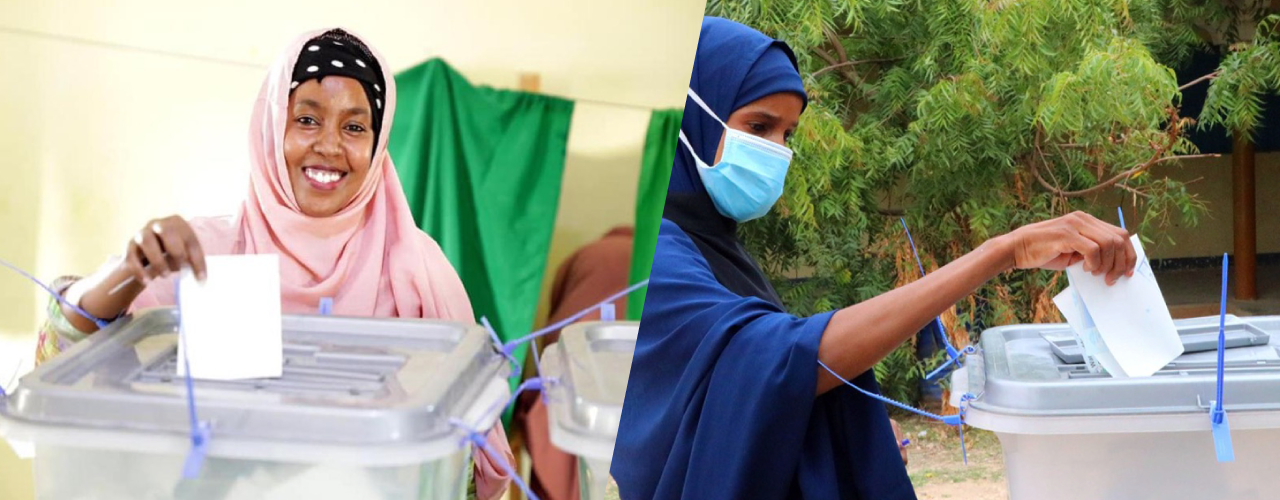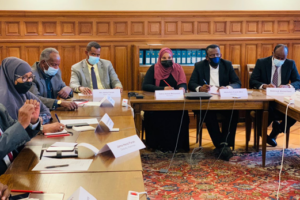Historic Puntland local elections pave the way for Somalia’s democratization

For the first time in more than half a century, three districts in the Puntland state of Somalia held “one person, one vote” elections last 25 October 2021.
The recently held elections in Puntland sets a historic precedent towards a more democratic process, where citizens themselves can elect their government leaders. Currently, Somalia’s government leaders are voted through indirect elections, with clan representatives electing parliamentarians who then vote for the country’s top representatives.
“The participation and jubilation from the population was truly profound,” said Ahmed Abdullahi, Interpeace’s Somalia Country Representative. “You could sense that there was a strong recognition of the significance of the historic process, a recognition that this will pave the way for Somalia’s democratization.”
One person, one vote election
The efforts of the past two decades as well as the increased awareness and engagement of civil society have created the conditions and demand for the successful early elections. There was also strong political will from the Puntland leadership, especially from the office of President Said Abdullahi Deni, demonstrating the support from the political elite and the recognition of the demand from their people.
Commissioner Guled Salah, Chairman of the Transitional Puntland Electoral Commission (TPEC), underlined how these elections is the product of many years of working towards democratization in Puntland.
“The first and the second TPEC rooted Puntland’s democratization process, drafting necessary electoral laws and guidelines. However, the commissions faced enormous challenges and ‘one person, one vote’ elections did not materialize,” said the Chair of TPEC, responsible for the management and rollout of Puntland’s local government elections. “Now a decade later, the vision of universal suffrage was achieved in three districts and we intend to finalize the remaining 47 districts by mid-2022.“
Beyond its historical significance, the municipal elections aim to inform how parliamentary and presidential elections at the state levels will be carried out, as well as lay the foundations for federal universal suffrage in 2025. The continued success of subsequent Puntland district elections is critical in paving the way for a bottom-up approach to electoral processes.
Inclusion and social cohesion towards electoral legitimacy
The recent elections garnered significant support from the population, including from the youth and women. More than 28,000 people cast their votes in Eyl, Ufeyn and Qardo democratically electing 87 council members, of whom 23 are women. More than 51% of the registered voters were women, and the youth accounted for more than half of the votes in all the three municipalities as well.
The universal suffrage system also allowed for internally displaced communities (IDPs) from other regions in the country to exercise their rights to vote and run for public offices as prescribed in the constitution. Muhsin Abdullahi, an IDP candidate, was among the councilors elected in Qardo.
Interpeace and its long-time partner, the Puntland Development and Research Center (PDRC), continued the effort of laying the foundations for local government elections by strengthening the social cohesion and increasing trust between the state and society.
These efforts were critical in creating the right conditions and conducive environment for public participation in the governance process and supporting peace infrastructures that allowed for credible and legitimate elections to take place.
“Interpeace is the oldest partner of TPEC and were the pioneers in supporting grassroot democratic processes in Puntland and supported the early electoral commissioners from 2012,” said Chairman Salah. “Interpeace’s role was instrumental in laying the foundations of this democratic journey.”

Building momentum towards 2025
Interpeace and its partners will continue to work with TPEC to ensure transparent and inclusive elections take place in the next phase of the elections. As part of its support, Interpeace has hosted TPEC in Geneva from 30 November to 4 December 2021 for a study tour, to learn and exchange experiences with number of stakeholders and experts on democratization and electoral processes.
This included exchanges with the Kofi Annan Foundation’s Electoral Integrity Initiative, the Geneva Cantonal Electoral authorities and the Institute of Federalism. The commission also met with the Somali Community in Geneva to solicit their support as part of their ongoing efforts to get the diaspora community to financially contribute to the electoral process.
“The main challenge now is maintaining and building on the political will from various stakeholders, including the public” said Abdullahi. “There are 47 other districts in Puntland preparing for elections, and this poses great logistical and resource challenges. For this to happen, significant collaboration and coordination among all partners is paramount.”
